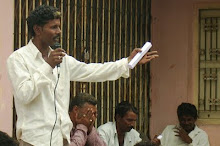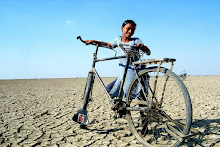Counterview:
Ahmedabad: Sunday, September 21, 2014.
The salt-pan
farmers of the Little Rann of Kutch in Gujarat are in a state of agitation.
Thousand of them, locally called “agariyas”, have been served a strongly-worded
notice which wants them to provide “proof” of the ownership of the land on
which they have been carrying on salt farming, or "quit". Issued by
the range forest officer, Wild Ass Sanctuary of the Little Rann, the notice
says that if they do not provide evidence of ownership within a week, cases
would be registered against them under the wildlife protection Act, which
stipulates fine of up to Rs 25,000 and jail from three to seven years.
The notice, a
copy of which is with Counterview, says that failure to comply by the order
would make the officials to confiscate their equipment in agariyas’ possession,
and they would be forcibly evicted from the Little Rann. Sources close to the
development say, already, eviction at several of the villages bordering the
Little Rann has begun. A week ago, 108 agariyas of village Adesar were stopped
from going to the sites where they were carrying on salt farming. At village
Naradi, four agariyas were detained, and their equipment confiscated.
Harinesh
Pandya of Agariya Heet Rakshak Manch (AHRM), NGO working in the with the
agariyas, told Counterview that they are being asked to “identify” the trucks
carrying gypsum, used in several industries as raw material and which is a
byproduct following salt farming, so that these could be detained. “They are
being told that either they should provide details of the trucks which
transport gypsum sold by agariyas to middlemen, or the bail of those who were
released would be cancelled”, he said, adding, “Livelihood of 12,000 families
directly dependent on salt farming, is at stake.”
The notices
have been served when a Gujarat industries department livelihood project for
agariyas to produce high quality salt is on. The project is being carried out
with the technical support of the Central Salt and Marine Chemicals Research
Institute (CSMCRI), Bhavnagar, which has developed a patented process for the
recovery of Industrial grade salt from sea/ subsoil brines and utilization of
bittern to produce value added products like potash and magnesium with community
help from three NGOs Self-Employed Women’s Association (SEWA), Anandi and AHRM.
“The notices
are also shocking as they have been issued when the World Bank’s biodiversity
project, costing Rs 25 crore, for the Little Rann of Kutch is in progress. The
World Bank project envisages symbiotic relationship between wildlife and local
people”, Pandya said, adding, “Faced with eviction, local leaders have begun to
approach MLAs and MPs representing the villages situated bordering the Little
Rann in four districts Rajkot, Surendranagar, Banaskantha and Patan.
Politicians are worried: Ahead of the Lok Sabha polls, Congress vice-president
Rahul Gandhi visited the Little Rann and put the area on national map.”
In fact,
according to Pandya, forest officials do not understand the implications of
forced eviction from the Little Rann. “Currently, agraiyas are lenient towards
wild ass, a rare species, who feed on their agricultural farmlands situated in
border villages. Once they are refused permission to enter the Little Rann, they
would start attacking the wild ass, as they would have to ensure that their
crop is not destroyed. There would be man-animal conflict. Things would go
particularly worse, as agariyas do not have any other alternative sources of
employment.”
Further,
according to Pandya, “There is no clarity in the government on how to treat the
agariyas. While on one hand, they are considered farm workers producing salt on
a no man’s land, which has not been surveyed to this date, but on the other,
the state industries department qualifies their job as a salt mining activity.
As a community in the Little Rann, they are entitled to use the natural
resources for their own survival under the Forest Rights Act, but mining is not
allowed.” Today, 75 per cent of India’s salt is produced in Gujarat, out of
which 40 per cent is produced using by the agariyas, while the rest is
industrial marine salt.
















.jpg)
.jpg)
.jpg)
.jpg)













No comments:
Post a Comment